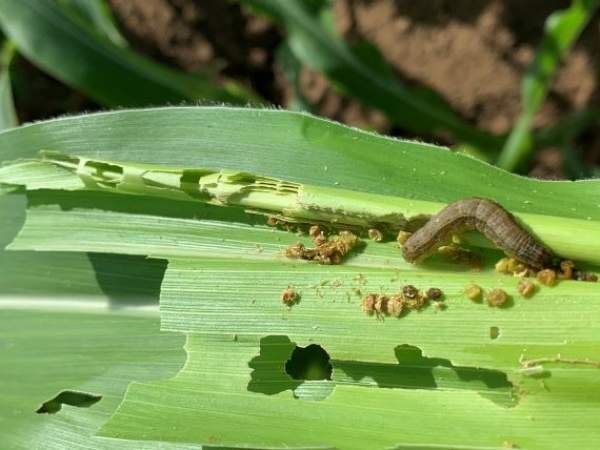NORTHERN TABLELANDS GROWERS URGED TO LOOK OUT FOR FALL ARMYWORM
Northern Tablelands Local Land Services (LLS) has urged farmers to be on the lookout for signs of fall armyworm (FAW) following the detection of multiple moths around Inverell.
LLS Pastures Agronomist, Georgie Oakes, said while this is one of the first detections in the Northern Tablelands, it is likely more cases of FAW will be reported over summer.
“We need growers, particularly those growing sorghum and maize, to be regularly monitoring their crops for signs of this pest, as early detection is the first step in effective management,” Georgie said.
“Landholders should be looking for windowing of leaves where larvae have hatched and small shot holes as leaves expand, caused by larvae feeding in the developing leaf whorl.”
“Small larvae are difficult to identify, so we recommend growers keep suspect larvae on host crop leaves and let them grow for a few days until they can be more easily identified through photographs.”
In most cases, NSW Department of Primary Industries (DPI) can identify larvae from clear photographs which can be sent via an online form or to biosecurity@dpi.nsw.gov.au with your contact details or by calling DPI on 1800 084 881.
To manage the pest, spraying of FAW with selective insecticides when they reach recommended threshold levels, targeting instars before larvae bury themselves in leaf whorls and ears of maize, will deliver the best results.
Parasitic wasps have been active in controlling FAW larvae, and growers are being advised to use selective insecticide options to conserve beneficial insects and help suppress FAW as part of an integrated pest management strategy.
DPI research entomologist, Lisa Bird, said integrated pest management strategies help optimise FAW control costs by taking advantage of natural enemies present in crops.
“DPI has found high levels of resistance to synthetic pyrethroids in FAW and growers are advised to avoid these chemicals, which are ineffective in controlling FAW and harm beneficial insects,” Dr Bird said.
“Overuse of selective insecticides could threaten Helicoverpa resistance management if there is an increase in the frequency of sprays in crops where the two species occur together.
“DPI has developed screening procedures closely aligned to those used in Helicoverpa to help monitor resistance in FAW.
“The use of organophosphate and carbamate chemicals is not recommended as genetic testing has indicated FAW carry markers for resistance to these chemicals. Broad-spectrum insecticides, which kill beneficial insects, are unlikely to provide effective control of FAW.”
The Australian Pesticides and Veterinary Medicines Authority has issued 37 FAW control permits, including new permits for FAW control in sweetcorn, safflower and sunflower.
Farmers should contact their LLS staff on 1300 795 299 or regular agronomist for advice on fall armyworm management. More information on identification, treatment options and resistance management is available on the DPI and LLS websites.
